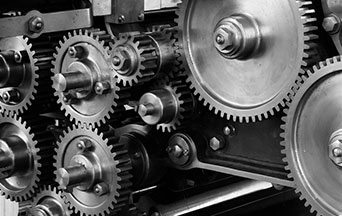 What is meant by “organic” or “inorganic” can be understood by comparing a living organism, such as a man or an animal, and a machine.
What is meant by “organic” or “inorganic” can be understood by comparing a living organism, such as a man or an animal, and a machine.
A man and a machine have some things in common. Each is made up of different parts that form a single whole. In both, every part carries out a function which contributes to the common purpose of each.
Yet, despite these analogies, the differences between the two are so great that one could almost call them unfathomable. The principal difference is that the machine is inert, static and dead; the organism is warm, agile and alive.
We can compare this difference in the following ways:
I – The movements of the organs of a living body come from the life present in them; they spring from the very depths of their being. The parts of a machine are unable to move by themselves. All their movements must come from outside. They do not actually move but are moved.
II – Living organs have a great capacity to adjust and adapt to new circumstances. This is usually a slow and delicate process of adaptation (as might be seen in the mending of a wound or in any growth) that usually takes place bit by bit but with great precision and durability. A machine remains as it was made and does not adapt to anything by itself. When someone wants to adapt it for some other purpose, it can be drastically changed since its matter cannot sense anything and one need not take its feelings into consideration when casting a piece of metal or working some other materials to modify the machine.
III – The parts of a body develop with a certain life of their own and independently of others. Thus, no one can impose a desired shape or size on one’s arms or legs. However, that which is artificial and mechanical is absolutely subject to man. A cripple can, for example, determine the weight, shape or color of a wooden or rubber leg to suit his taste or convenience.
IV – A living being is a part of nature, which is the direct work of God. A machine is a more direct work of man. Thus, everything organic is much more perfect, even though all things mechanical are much more subject to science. For example, no matter how much science perfects mechanical arms and legs — and it has done wonders in this area — any man will still prefer his own natural leg or arm, though impaired, to one of these “wonders.”
V – All parts in a machine obey like slaves the will of the one who turns on and operates it. The most important thing is the will of the machine’s operator. There is only one possible way of running a machine: dictatorship. When a machine malfunctions, the only solution is to open it up, take it apart, remove the defective part, and fix it with tools. Fixing a machine with mechanics is always much more effective that surgery in a living being. In the human body, human activities depend, not upon the slave-like obedience of the organs, but on the natural, living, and to some extent “free” (note the qualifier) cooperation from each part.
Thus, we have presented the difference between the concepts of “organic” and “mechanical” or “inorganic.”
Adapted from an article by Plinio Corrêa de Oliveira, published in Catolicismo, November, 1951.

